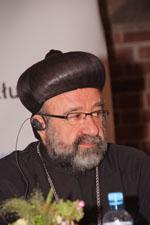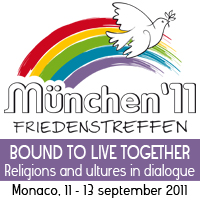
Metropolita ortodoxo de Aleppo, Siria
|
I would like to thank the Community of St. Egidio for its efforts to invite people and Church leaders to be together as a follow up of the Prayer for Peace initiated by His Holiness the late Pope John Paul II.
I hope and pray that the consequences of this meeting, which will address the theme of: Christians in the Middle East, will highlight the importance of living together, and reflect on the background of this concept, especially in our current troubled situation in the Middle East.
(1)
The Middle East is rich in civilizations and religions. We, the children of the Middle East, laud the glories of our civilizations and hold dear the teachings of our religions. I will just mention the civilizations of Mesopotamia, the Levant, the Nile Valley and other civilizations, which ruled and have given significant contributions to humanity. As for the monotheistic religions -- Judaism, Christianity and Islam, -- there is a conviction that all their teachings come from one source, the God whom they all worship. He is their God, who distributes gifts and talents to all. Out of this perspective, we always support constructive dialogue between the children of the monotheistic religions. We work for the continuation of fraternity, understanding, love and the spread of justice and peace among the various nations of the region.
Christians in the Middle East, Maronites, Copts, Syrians, Greek (Melkite) Chaldeans, Armenians and Latins, are fairly easy to categorize into their churches, despite the fact that they belong to different churches and denominations, and have practices and traditions, historical backgrounds, languages, rituals, whose roots may even stretch to known places in the region. We use the language of family, and all of our churches and denominations are members in the Middle East Council of Churches under the name of family.
There is the Oriental Orthodox family – Syrians, Copts and Armenians. There are the Byzantine Orthodox who are the Greek Orthodox in Damascus, Jerusalem, Egypt and Cyprus. The Catholic family has seven different churches. The Evangelical family includes all the known evangelical churches in the region. Nevertheless, under banner of the ecumenical movement, we work together in our various activities and consider the ecumenical movement the means for closeness between the various churches despite all the divisions and splintering among them for reasons that appear to be dogmatic, but whose real motivations were political, ethnic, linguistic or civil.
Christians are happy to note that good relations among churches are flourishing and one hopes and praise that Christians would have one voice in defending the Christian presence and witness for our Holy Scripture and the teachings of our forefathers, and the traditions. Only in this way we can continue serving and giving as our ancestors did for centuries.
I would like to mention here that one of the main challenges in the life of all churches in the Middle East is immigration. The circumstances in the region starting from World War I up till the sad incidents happening now in our region have had a negative impact on our Christian presence. Forced immigration resulted in emptying many places in our Christian region. We always wonder where the Christians of Turkey, Iran, Palestine, Lebanon and Syria are after the big and little wars. Why have their numbers declined, and their churches, schools, centres and places of worship closed? They still live this pain. In our church we have been hit by wars from two sides. First, the massacres that killed no less than one hundred thousand Syrian Christians between 1914-1918.We have fairly reliable records of those events. We lost many churches and monasteries that dated back to the 4th, 5th and 6th centuries.
Second, the immigration of a large number of Syrian Christians abroad. With ninety years of experience, we know that they have melted into their societies, and thus the church lost them. There are several factors causing this continued immigration of Christians among these are weak economic situation in the region, fear of the future, unstable political situations, and the church’s inability to do developmental projects to assist people seeking employment and marriage. All these factors encourage individual and group immigration. If this haemorrhaging continues, the day will come when we will all face the same reality: Christianity will cease to exist in the region and our churches will not have a deacon to reply the word “Amen” after the priest.
I am giving you this testimony, reminding myself of the dramatic situation today in Iraq, Egypt and Syria. Do you know what it means for the Christians in these countries to have a church leader kidnapped or a priest killed, like in Iraq? Such incidents have shaken the confidence of believers.
The immigration of Christians from the East throughout the last few decades, has contributed not only to weakening the involvement of Christians in the public life of their countries; but it also contributed to the loss of qualitative individuals and groups who were eligible to be unique contributors to the solutions of some political and religious conflicts which are taking place in the region.
Today, the threat to Christianity in the East is real. It is a direct threat which both challenges and undermines Christian presence in the Middle East.
The map of our contemporary Middle East is now a century old. Political geography is stable; but cultural, religious, ethnic and demographic factors are spinning restlessly out of control along its borders.
Now and then, we come across the circulations of new maps of the Middle East. They are highly suggestive, evocative, fragmentary and provocative, hinting that the current map of the Middle East has outlived its usefulness.
Many may go along the conspiracy theory that the current events that are sweeping the Middle East are to impose geopolitical changes in those maps: Tunisia, Egypt, Libya, Yemen, and Syria.
Usually, geopolitical changes will not pass without consequences. All the possible alternatives present a potential nightmare scenarios.
Furthermore, neither the Arab Spring, nor the spring of the Turks, or the Kurds seem to be the least concerned with the human rights of Middle Eastern Christian communities.
We wish that the current political impasses in the Middle East will pass without any further upheavals, distractions and loss of sacred lives, so that Middle Eastern Christian citizens can carry on living under the principle of religious fraternity, co-existence and national unity. Disturbances of stability and security in the Middle East will lead to internal and external crises, which will directly undermine and affect the presence security of all citizens, including Christians.
What happened in Iraq since 2003, the demographical and geographical changes, and more recently in Egypt, could be repeated in Syria with horrific consequences.
(2)
As you know, Syria, my country is given a special attention from the international media.
I would like to highlight the current situation in Syria, and the role of Christians in the context of this troubled society.
In Syria, we are witnessing in some towns unprecedented upheaval. The burning questions now are:
¬ What outcomes are the International media expecting in Syria?
¬ Where will these demonstrations and protests lead us to, and when will it be end?
Wise observers testify that the current disturbances in Syria negatively affect Syria and its proposed reforms, its continued support of Palestinian liberation, the region’s central cause and its role in the current affairs in the region. Syria pays a heavy price and will continue to do so its role in the region as noted above.
Christians used to praise the milieu of religious tolerance in Syria. They are merely stating the facts of the exemplary status of Christians and other non Muslims in Syria. Those of you who have experienced Syria would testify to that. Everyone else invited to give an example of religious tolerance that outshines the Syrian example in the Middle East, indeed in the whole Islamic world.
We think reformers have the universal right to freely assemble, demonstrate peacefully, and to seek redress from their government. The government should respond to the legitimate grievances and concerns expressed peacefully by the demonstrators.
Similarly, Christians condemn, without reservation, mistakes, malpractice and corruption at any level. They would whole heartedly support all peaceful demonstrations, and protests, and organise reforms at all levels. They would condemn any malpractices or violence and the destructions of public properties.
Syria belongs to all its citizens and violence is an affront to peaceful and good Syrian citizens.
For Syria, and its Muslim Arab citizens, nothing can compensate the potential loss of a considerable sector of its faithful, the Christians, who are productive and good citizens and have served and will continue to serve the country, and do their best to enhance co-existence, social justice, tranquillity, stability and peaceful coexistence.
We hope to see, and feel fervent support for the Peaceful resolution of our domestic difficulties, to which all faithful and peace loving Syrians look forward. We seek social justice, and peace to prevail in all walks of life; so Muslims and Christians can continue to live together.
In our global village, the issue of the presence, co-existence and continued witness of Christianity in the Middle East, is in desperate need of special global attention. Time will tell that with or without meaningful democracy in the region, the presence of demographically challenged indigenous communities may prove untenable.
We urge international religious and humanitarian communities to check the truth, and witness that any demographic or geographic changes in Syria would affect the whole region. This is not mere words or slogans, but a real fact. We in Syria do not want destruction but construction. We support every peaceful initiative to maintain our country and the region, and protect them.
This is the general and unfolding situation in Syria. We appeal to our friends, especially those who are aware of our position, to pray with us for the sake of peace and stability in the whole world, and in the Middle East in particular.
I repeat my request to every individual for prayers to safely end the crisis in the area.
Thank you.
|

